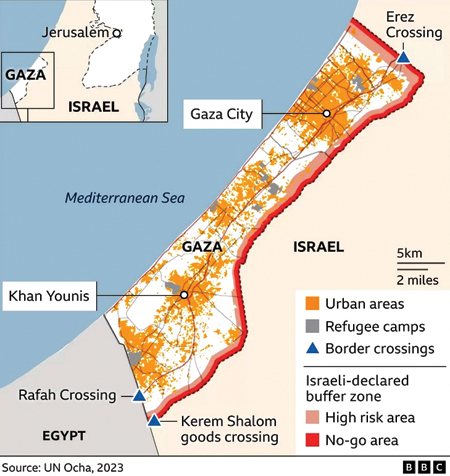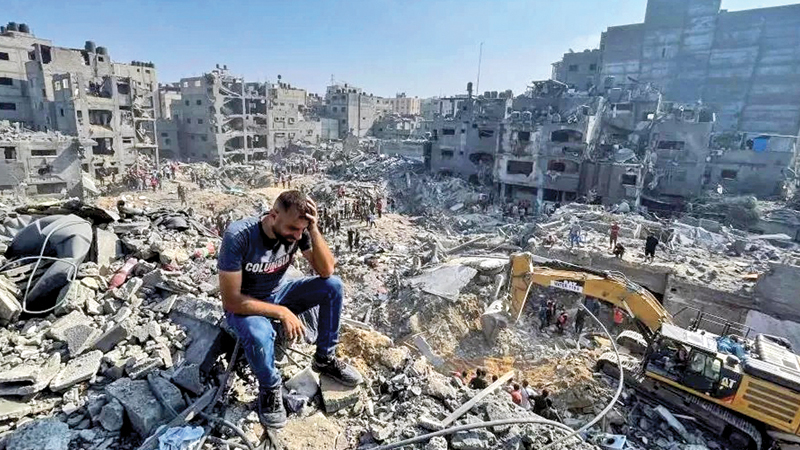Gaza is a city in the Palestinian region of the Gaza strip with a population of 590,487 (2018) that pronounces Gaza as the largest city in the State of Palestine. Hamas is an Islamic Resistance Movement that governs the Gaza strip of the Israeli-occupied Palestinian territory and is populated by political and military agendas. The rival to this nation is Israel (8 million populations) and Mossad –the State Intelligence service of Israel which is headquartered in Tel Aviv and the Defence Forces places interest in the Gaza war. The rivalry between the two nations is not only a geo-political struggle but also a humanitarian crisis.
The article aims to address two aspects. Firstly, to understand the military dynamics of the Israel-Hamas war in the Gaza strip and secondly, to evaluate the impact of the war on the social welfare of the citizens of the two contested nations and the Middle Eastern region at large. As a terrible issue is being encountered by the people, institutions and country, the United Nations describes the war as a dynamic discourse of the century.
Issues
On October 7, 2023, the Palestinian armed groups in Gaza launched thousands of rockets, missiles and aerial firing towards Israel (UN, 2023). These attacks projected its way through the perimeter fence of Gaza and entered into Israeli towns especially Ashdod, Ashkelon, and Haifa killing and capturing Israeli forces and civilians. The second phase was that the act of terror had a retaliatory effect where the Israeli military exercised its right of defense. It declared a state of war alert and targeted residential buildings and hospitals in Gaza as it advanced its attacks on the Palestinian territory. 28 percent of Gaza’s population was displaced amidst the 108,000 people of both Gaza and the west bank occupied territories recorded their homes were uninhabitable as envisaged by the United Nations. In the light of the facts in issue, it can be questioned whether the act of Israel in its right to private defense as a nation used proportionate force in order to retaliate the attacks of Hamas. Also it is a relevant fact to the case whether the mechanisms utilised by the Israeli Defense Force (IDF) to calculate and execute the attack-based damages are ethical and unbiased. Furthermore, the UN and monitoring agencies strongly detest and criticise the acts of warfare by the IDF on Hamas.
Analysis
 In the light of the warfare, rubbles and mourning the dynamics of Gaza-Israeli war can be analyzed inter aliaas war tactical implications, humanitarian costs, social biases.
In the light of the warfare, rubbles and mourning the dynamics of Gaza-Israeli war can be analyzed inter aliaas war tactical implications, humanitarian costs, social biases.
War tactics-The infiltration of Gaza attacks on Israel was combated by means of the Iron Dome, a protective dome fence over the skies of Israel especially its commercial metropolises. The Dome buys Israel time and very few Israelis die because of the protective technology that diverts the Hamas attacks to barren lands. Then the use of force by Israel on Hamas in killing Palestinians should be minimal as a countermeasure. However, the assessors’ belief is that Israel used disproportionate force and entered into severe war against Palestine that does not justify the use of force in the military operation on Hamas. In the interest of national security, Israel could redefine its approach to war.
Massive destruction
The attacks on Gaza and west bank are viewed in a paradoxical position between human rights violation and violation of humanitarian rights. The Israel attacks have destroyed the hospitals (largest AlQuads) in the Gaza strip which are treatment centers and key sites for Palestinians seeking refuge from intense bombardments.The right to peaceful settlement and free from threat to live is violated thereby constituting violation of human rights of Palestinians by Israel forces.In the instance as anticipated by Israel’s heritage Minister if Nuclear power is used against Gaza the long-term effects will be negative and vicious.
Moreover, the Palestinians were asked to evacuate their homes to mitigate the danger from upfront attacks is a sign of violation of the right to live. The Israeli administered Palestine territory is controlled and managed by Israeli authority. In this light, Israel cut the supplies and aid to the wounded victims resulting in violation of humanitarian rights.
Telecommunication, infrastructure resources and other assets in Palestine have been cut off by heavy Israeli bombardment disturbing the normalcy of life and civilian operations.
The occupied territory experienced bloodshed as ambulance convoys and schools were attacked by missiles and air bombing denoting that both human and humanitarian rights are infringed constantly by Israel. The UN cites this as acts of war crimes against humanity justifying the severity, intensity and extent of damage by the actions by Israel.
Israel is the nation for the Hebrew-Jews. However, there are Jews originating and living in Arab nations populated by Islamic religious people in Palestine and other countries like Egypt, Yemen, Jordan and Lebanon. In the militant retaliations between Israel and Palestine there is a chance for killing and injury to Arab Jews who also have lineage and inheritance to Israel. With the expansive settlement off Israel to the west bank and occupied territories the demographic dispersion also has increased. The Israel attacks on Gaza can have an effect on the safety and security of Arab Jews who are settled in Palestine. The war has no stronghold protection to the Jews.
Future trends
In a dilemma moment, the recognition of Israel as a Nation/state among the Arab world is rapidly declining due to acts of cruelty in the warfare. Yet optimistically the situation calls on for a humanitarian ceasefire. This mandates the releasing of Palestinian hostages and safeguarding refugees by Israel, however a rarely realisable stance but worthy.
A tangible plan is issued by the UN to the parties to invest in minimum necessary to scale up humanitarian operations in support of 2.2 mn people in Gaza and vulnerable West Bank. It is estimated that $1.2 bn is required to provide the humanitarian services amidst the battle and effects. However, positive response from donors and minimal operational constraints are essential to effectively facilitate it. In this interest of the national economy, the cost of war both financial (Monetary) and non – financial(emotional /loss of love and belongingness) should be ascertained.
The Political heads look ahead to a comprehensive political solution that will reduce effects of the Israel-Palestine conflicts.
This involves compromising and negotiation by agreements, words and deeds. Populated Gaza, an urban environment requires Israel and adversaries to adjust the use of military power force to minimise the loss and harm to the area, property and mainly lives, unlike if the war tactics were displayed in rural less dense areas.
Therefore, a three-fold match between defence tactics-geographical location and military weapon is a crucial indicator to operationalise war within the parameters of the accepted war tactics.
There is a rise in discrimination against and a prejudice towards the Jews due to the disproportionate use of force by the Jewish dominated Israeli forces. There is a future trend of antisemitism and the anti-Semites that will hate Israelites and the rumors, hate speech and other forms of tarnishing image of the Jewish nations will have prolonged effects on the country and its people.
Conclusion
The campaigns of the two nations at war rarely understood the rate of casualties prior to launching attacks. Their warfare became unethical and unacceptable as well.
While understanding the adversary was a critical factor the socio-humanitarian effects of war emerged as primary outcomes. The military tactics and approaches certainly made the Israel-Hamas war a bad faith narrative exercise.
The writer is a Senior Lecturer at the Faculty of Management, Social Sciences and Humanities, General Sir John Kotelawala Defence University. She is also a researcher in project policy and has lived and studied in Tel Aviv, Israel from 2009 to 2013.






